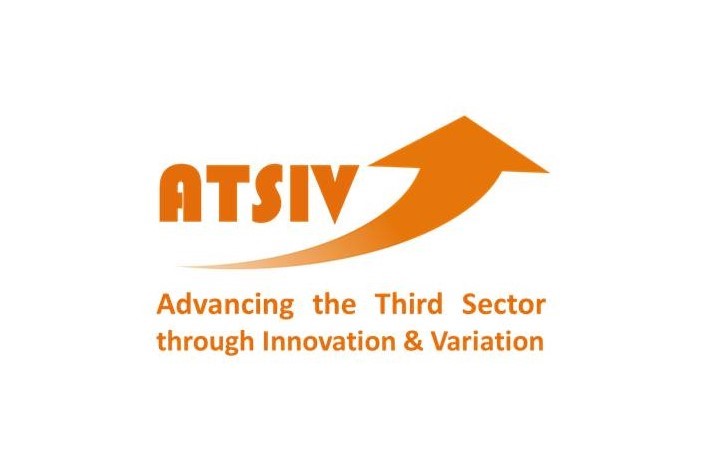
Advancing the Third Sector through Innovation and Variation (ATSIV)
Project Concept
Lower income regions such as the crisis struck and underdeveloped East, South East and Mediterranean (ESEM) EU Countries are in desperate need of innovative ideas to support regional growth, to preserve living standards and to adhere to global trends. However, it is quite often that such regions fail to meet such demands and provide its citizens with adequate tools and mechanisms to support this appraisal (Abazi and Aliu, 2015). Having recognized this context, Non-Governmental Organizations (NGOs) and, more recently, social enterprises, have, been among the top new job providers in the EU. However, these positive developments have mainly affected West European countries such as UK. In ESEM Europe it has been rather difficult to mobilize people for social ends and attract especially the young generation in voluntary organizations (Sotiropoulos 2005).
Thus, in order to address this matter, NGOs play a central role – by being the key institutions having the capacity to engage more people into this working sector. Nevertheless, there is a highly confirmed multi-lateral skill gap of NGO (adult) workers in ESEM countries from the basic project management and budget raising strategies to the ones most critical for NGOs – necessary skills of their staff to actively engage with stakeholders and actively promote NGOs as the new emblematic image of ESEM countries by encouraging more people to join this sector and help to achieve a EU-wide homogeneous active citizenship and social cohesion, while mitigating groups at risk (Clarke et al 2015; Frangonikolopoulos 2015). However, such skills can be acquired only through co-creation (in an open innovation manner) between adult NGO workers and the involved stakeholders: society (primary resource), research/innovation (for best practice transfer), policy makers (favouring policies), industry (philantropy and social inclusion in growth mechanisms) as well as any other associations – all these stakeholders being acknowledged as the quadruple helix system (Carayannis & Campbell, 2012; Chesbrough, 2013). Considering the similarity of this problematic context in ESEM countries, this project (ATSIV) will develop a multisectoral network of partners from Greece, Bulgaria, Romania, Poland (the four ESEM countries) in order to develop the required skills of adult NGO workers from ESEM countries by infusing best practices from already successful Western societies (i.e. UK) where these skills are flourishing. ATSIV adheres to OECD’s vision that “adult skills and in particular civic engagement skills by capitalizing on NGOs form an integral part of adult education – next to literacy and numeracy” and thus adult education in this field is core to ATSIV. This transnational aim will be achieved through the following objectives:
1) Perform a training needs analysis (TNA) of the existing skill gaps in the involved countries as well as collect a base of best practices in terms of NGO related skills (globally, from developed countries).
2) Together with quadruple helix stakeholders, co-create an NGO game-based curriculum to fill the skill gap of adult NGO workers. The innovative curriculum will be game based in order to provide constructive social learning and progress based-cohesion as well as social group discrepancy mitigation.
3) Develop an open access (globally) virtual learning environment (VLE) in order to enable co-creation in an open-innovation manner. The VLE will contain the NGO game based curriculum as well as best practices that will shape the skills of adult NGO workers. The VLE will enable forum-based co-creation for quadruple helix stakeholders (open access) in order for the stakeholders to constantly co-create and moderate the curriculum & best practices/scenarios posted online (by the learners involved in the game) in order to ensure that the NGO game based curriculum & best practices are highly suitable for the needs of each stakeholder involved in this process. This approach will also enable mass impact and mobilization at no cost for disadvantaged adult NGO workers ensuring a homogeneous impact in EU.
4) Organize three transnational face-to-face pilots with the involved ATSIV partners and quadruple helix stakeholders in order to capitalize the co-creation and ensure an optimum VLE and game based curriculum.
Project Results
ATSIV will impact in terms of: more skilled and socially aware adult NGO workers; enhanced quadruple helix co-creation and local/regional/national/EU level, increase of active citizenship, mitigation of the social groups at risk, boost of NGO job market, increased philantropy from quadruple helix stakeholders towards NGOs, cross-EU homogenous NGO innovation through co-creation, achievement of EU2020, EU Digital Agenda, EU Social Cohesion & active citizenship agenda, EU HE Modernisation/Internationalization Agenda, Digitalization of industries, EU directive on social entrepreneurship, etc.
Duration
01/10/2016 – 30/09/2019
Funding
ERASMUS+
Partners
University of Peloponese, Greece
South East European Research Centre (SEERC), Greece
Fundacja Wspierania Organizacji Pozarzadowych “UMBRELLA”, Poland
National School of Political Studies and Public Administration, Romania
Higher Incubator Giving Growth & Sustainability (HIGGS), Greece
Law and Internet Foundation, Bulgaria

